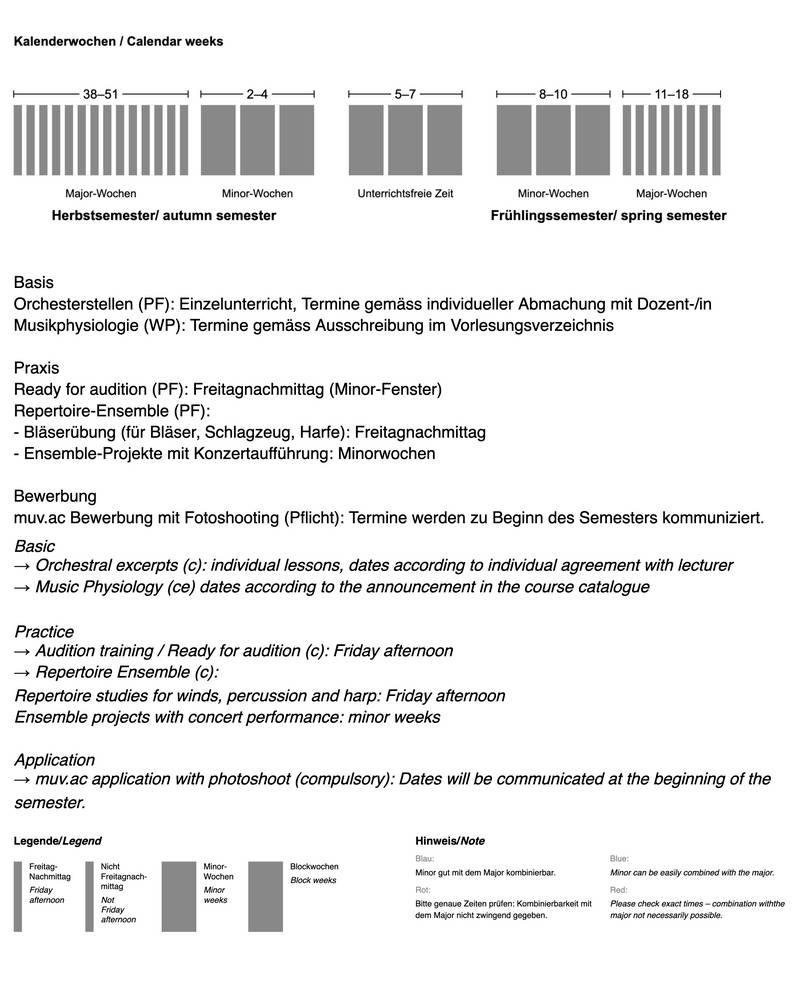Orchestral Studies
Prepare for auditions, starting your career and working as an orchestral musician.
Study level
BA and MA
Coursework
15 credits
Teaching language
German / English
Start of studies
Every autumn and spring semester
Number of study places
Not limited
Course times
See time structure
Programme
Course content.
Students with the professional goal of playing in an orchestra receive a sound education in this minor. The Orchestral Studies programme deals with symphonic and opera literature in an exemplary manner – both in instrument-specific individual lessons (orchestral positions) and in register group lessons and ensemble contexts. Students benefit from audition training (combined with mental and general audition training) and from a pre-professional programme on topics such as board work, conflict management, orchestra leadership and professional models.
The minor in German and English is offered by the Interpretation & Performance profile. It is aimed at the Bachelor’s and Master’s degree levels.
Skills acquired in the course.
The Minor “Orchestral Studies” prepares students for auditions, entry into professional life and the profession of orchestral musician. In addition to instrumental instruction, this includes aspects of rehearsal work, mental training, preventive healthcare measures, social skills and a stylistically broad repertoire.
Admissions requirements.
“Orchestral Studies” is recommended for advanced instrumentalists with a major in violin, viola, violoncello, double bass, harp, flute, oboe, clarinet, bassoon, trumpet, trombone, horn, tuba, percussion or timpani from the Bachelor Music, Master Music Pedagogy, Master Music Performance and Master in Specialized Music Performance degree programmes. Admission is subject to an examination of the subject-specific entry competences.
Language skills required.
You need the following languages to take this minor:
– German or English: to be able to follow a discussion
– German or English: to actively participate in a verbal exchange
– German or English: to understand a text
Benefits of studying at ZHdK.
Lecturers in the minor are professionally active in top national orchestras such as the Tonhalle Orchestra Zurich, the Philharmonia Zurich, the Orchestra of the Musikkollegium Winterthur, the Bern Symphony Orchestra or the Lucerne Symphony Orchestra. They have long-standing professional experience in these or comparable, international ensembles. This expertise has been imparted with great success at ZHdK for decades and is now made available to all degree programmes via a minor. In the field of music medicine, ZHdK is a leader and enables thorough support of training in vessels such as psycho-physiological audition training, mental training as well as prevention of health problems (Dispokinesis).
Time structure.
Basic
→ Orchestral excerpts (compulsory): individual lessons, dates according to individual agreement with lecturer
→ Music Physiology (compulsory elective): dates according to the announcement in the course catalogue
Practice
→ Audition training / Ready for audition (compulsory): Friday afternoon (minor window)
→ Repertoire Ensemble (compulsory):
Repertoire studies for winds, percussion and harp: Friday afternoon (minor window)
Ensemble projects with concert performance: minor weeks
Application
→ muv.ac application with photoshoot (compulsory): date to be arranged individually with lecturer
→ Semester dates ZHdK
→ More information about this minor (PDF download)
Time structure
Major-Minor Programme Model
At ZHdK, students choose a Major. In addition to this core subject, they can choose one or two Minors to deepen or expand their major skills and knowledge across various disciplines. This wide choice of courses is unique in Europe and enables students to develop and sharpen their individual profile.

